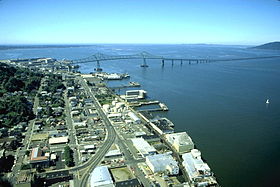Continuous truss bridge
A continuous truss bridge is a truss bridge which extends without hinges or joints across three or more supports. A continuous truss bridge may use less material than a series of simple trusses because a continuous truss distributes live loads across all the spans; in a series of simple trusses, each truss must be capable of supporting the entire load.

Although some continuous truss bridges resemble cantilever bridges and may be constructed using cantilever techniques, there are important differences between the two forms. Cantilever bridges need not connect rigidly mid-span, as the cantilever arms are self-supporting. Although some cantilever bridges appear continuous due to decorative trusswork at the joints, these bridges will remain standing if the connections between the cantilevers are broken, or if the suspended span (if any) is removed. Conversely, continuous truss bridges rely on rigid truss connections throughout the structure for stability. Severing a continuous truss mid-span endangers the structure. However, continuous truss bridges do not experience the tipping forces that a cantilever bridge must resist, because the main span of a continuous truss bridge is supported at both ends.
It is possible to convert a series of simple truss spans into a continuous truss. For example, the northern approach to the Golden Gate Bridge was originally constructed as a series of five simple truss spans. In 2001, a seismic retrofit project connected the five spans into a single continuous truss bridge.
Examples

Some notable continuous truss bridges, with main span lengths :
- Ikitsuki Bridge, 1,312 ft (400 m)
- Astoria-Megler Bridge, 1,232 ft (376 m)
- Francis Scott Key Bridge, 1,200 ft (370 m)
- Taylor-Southgate Bridge, 850 ft (260 m)
- Julien Dubuque Bridge, 845 ft (258 m)
- Charles M. Braga Jr. Memorial Bridge, 840 ft (260 m)
- Governor Harry W. Nice Memorial Bridge, 800 ft (240 m)
- Don N. Holt Bridge, 800 ft (240 m)
- Sciotoville Bridge, 775 ft (236 m)
- Owensboro Bridge, 750 ft (230 m)
- Carroll C. Cropper Bridge, 750 ft (230 m)
- Sewickley Bridge, 750 ft (230 m)
- Betsy Ross Bridge, 729 ft (222 m)
- Cape Girardeau Bridge, 671 ft (205 m) (replaced in 2003)
- Champlain Bridge, 450 ft (140 m) (demolished)